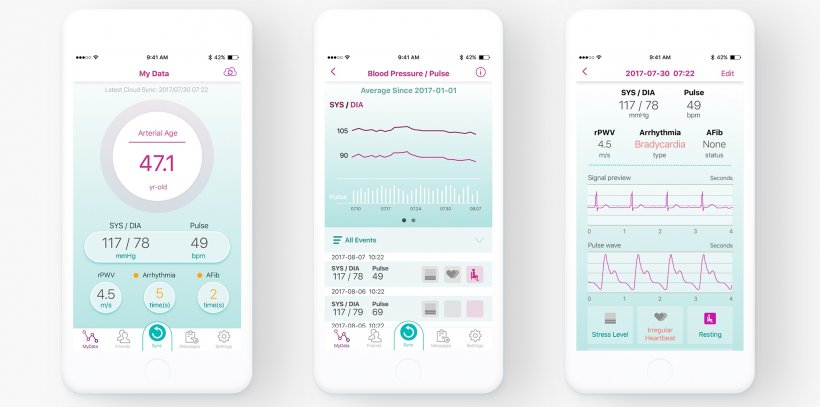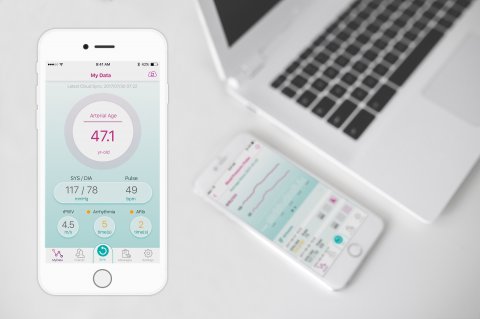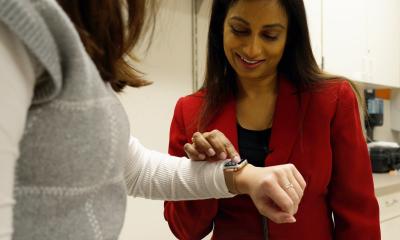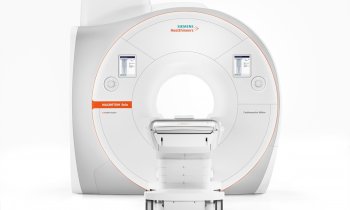
Source: Maisense
Sponsored • Cardio app
AI system screens early Phase AFib
Here at Medica, the Taiwanese start-up Maisense is demonstrating Freescan, its artificial intelligence (AI) based solution to screen for stroke through the early detection of atrial fibrillation (AFib).
Speaking of the system’s aims, Maisense summed up this huge health problem. ‘Every four minutes, someone dies of stroke. Thirteen percent of these are classified as haemorrhagic stroke. When the arteries of the brain weaken or break, allowing blood to spread in the brain tissues, haemorrhagic strokes occur. They are most often caused by chronic hypertension. Up to 87% of strokes are classified as ischaemic. An ischaemic stroke occurs when a clot, or mass, blocks a blood vessel, cutting off blood flow to part of the brain. There are two main risk factors for ischaemic strokes: arterial stiffness and atrial fibrillation (AFib).
Since an AFib episode can come and go, many patients may be undetected and therefore didn’t receive timely treatment
Benjamin Chiu
The research ‘Changes in arterial stiffness independently predict stroke in patients with essential hypertension’, published in 2018 European Society of Cardiology (ESC), shows a demonstrated association and prediction between arterial stiffness and stroke for essential hypertension patients, Maisense points out. ‘The Framingham Heart Study (FHS) identified common factors and characteristics contributed to cardiovascular disease. Low-density lipoprotein (LDL), also called “bad cholesterol”, is a notable enemy of arterial elasticity and fosters arterial stiffness. High LDL level raises the chances of a heart attack because it deposits in the walls of blood vessels that narrows the arteries or even clog. Other risk factors such as age, hypertension, smoking and diabetes are highly related to cardiovascular diseases.’
AFib patients have a five-fold increase in stroke risk compared to those without. 4.5 million people in the EU are affected. It, and accounts for approximately one-third of hospitalisations for cardiac rhythm disturbances. The European Heart Rhythm Association (EHRA), which published those quoted numbers, released a classification system of AFib-related symptoms in 2014. The EHRA also stressed the fatal consequence even if AFib symptoms are not noticeable to the patient or they may not feel uncomfortable. ‘Since an AFib episode can come and go, many patients may be undetected and therefore didn’t receive timely treatment,’ said Benjamin Chiu, CEO of Maisense. ‘That’s why we take AFib screening seriously as a key measurement for stroke prevention.’

AFib is usually diagnosed on an ECG, but if a patient’s symptoms don’t occur while he sees the doctor, or if they are back to normal at the time, the doctor would could not give proper advice.
The Maisense Freescan device and my Freescan App deliver an all-in-1 solution, utilising artificial intelligence (AI) for early AFib detection, arrhythmia (bradycardia and tachycardia) detection, pulse wave velocity, and blood pressure monitoring in a single device. Users adopting Maisense's solution can assess their risk level of stroke anytime, the firm adds.
‘From the patient’s perspective, the solution makes it very easy to measure and record all these biomedical signals at any time. Patients can monitor their own health conditions and take early action. Through the web-based Patient Care System, doctor also can be informed immediately when abnormal incidents occur – if a patient activated this function under doctor-patient privilege. It also provides sufficient data for doctors to make a quick assessment, thus avoiding unnecessary healthcare spending, saving time and improving efficiency.
Since Apple announced its Watch Series 4, which can record ECG and has received FDA approval, it is believed that considerably more people know the importance of irregular heart rhythm detection. The all-in-one Maisense system screens the top three causes of stroke: arterial stiffness, hypertension, and AFib in just one device.
Maisense is at MEDICA:
11.11.2018











